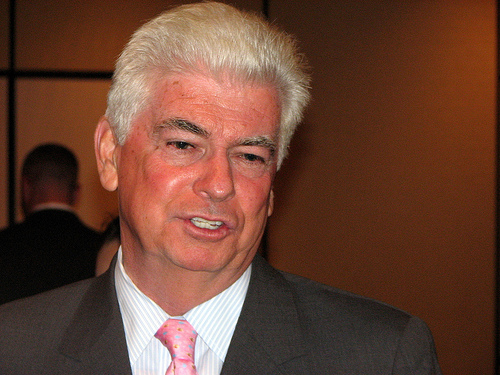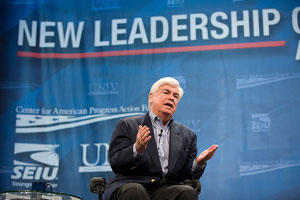
Flickr/<a href="http://www.flickr.com/photos/davidberkowitz/2852187854/">David Berkowitz</a> (<a href="http://www.creativecommons.org">Creative Commons</a>).
UPDATE: Mother Jones has obtained a copy of Dodd’s consumer financial protection plan.
Sen. Chris Dodd (D-CT) has dealt the death blow to consumer protection. The silver-haired senator, who chairs the Senate banking committee, plans to announce this week the creation of a Bureau of Financial Protection inside the Treasury—not unlike the Food and Drug Administration’s placement with the Health and Human Services Department—instead of an independent, standalone Consumer Financial Protection Agency, according to a leaked document obtained by the New York Times. The fate of consumer protection has been a chronic migraine for Dodd; his initial Republican co-negotiator, Sen. Richard Shelby (R-AL), abandoned talks with Dodd over a dispute on the CFPA, and Dodd’s current dance partner, Sen. Bob Corker (R-TN), called an independent consumer agency a “non-starter.” If Dodd does indeed gut the CFPA, the decision sets the stage for a showdown with the Obama administration and the House, both of whom want the CFPA, and in particular Rep. Barney Frank (D-MA), who told Mother Jones the agency was a “dealbreaker” for him.
According to the leaked proposal, the president would appoint the Bureau of Financial Protection’s director and its responsibilities would include overseeing big banks as well as non-banks, like the subprime lenders who peddled millions of explosive mortgages and preyed on unwitting consumers. The agency, the Times reports, would also have the authority to implement new financial regulations, but would handle rule-making a lot like the SEC does now:
The Dodd proposal would require the bureau to consult with other regulators before issuing rules and to make public any objections raised by those regulators, along with an explanation of how the bureau addressed the concerns. Those regulators also could appeal the proposed rule to a new interagency council tasked with detecting systemic risks.
The proposal would exempt banks and credit unions with assets of $10 billion or less. It would give the bureau the power to enforce regulations on large banks and nonbank lenders, in conjunction with other regulators, but would largely have to defer to other regulators in the case of smaller banks.
Dodd’s decision to go with a Treasury-housed consumer-protection agency instead of an independent agency—which he claimed to have supported earlier this month—is undoubtedly a move to garner bipartisan support for financial reform in the Senate. The senior senator has stated on numerous occasions that he wants to pass a major financial-reform bill before he retires this fall, and ditching a tough, standalone Consumer Financial Protection Agency for a more bureaucratic solution is one way to win some Republican support, even though Dodd himself said last fall that “There needs to be an independent agency that looks out for people when they take out a loan, open a checking account or use a credit card.”
Inside a Wall Street-inclined Treasury Department—the previous secretary was a former Goldman Sachs CEO; Geithner, while not a banking alum, relies on Wall Street’s advice more than anyone else; and plenty of other current staffers are former Big Finance types—it’s unclear whether consumer protection would actually be a priority or not. Elizabeth Warren, who initially concocted the idea of a CFPA and is a leading consumer advocate in Washington, certainly won’t be pleased with Dodd’s new plan, just as most consumer advocates lobbying for greater crackdowns on predatory practices will be left disappointed.
If there is a winner emerging from Dodd’s new consumer plan, it’s the lobbyists who lobbied to kill the CPFA. Chief among them is the US Chamber of Commerce, who went so far as to create an entire website, StoptheCFPA.com, to ensure the independent agency met its demise. Now, as Dodd and the banking committee roll out their bill this week, it looks like the lobbying onslaught by the Chamber and its allies paid off.
















